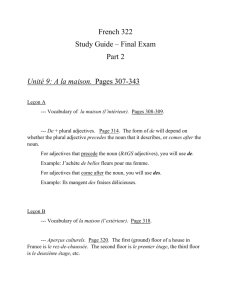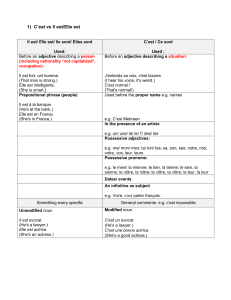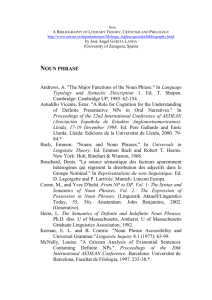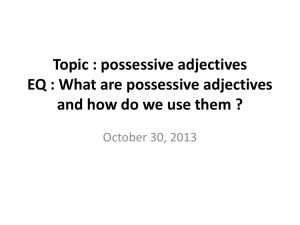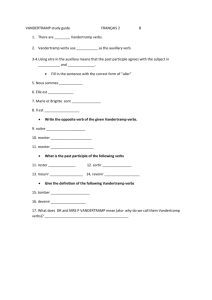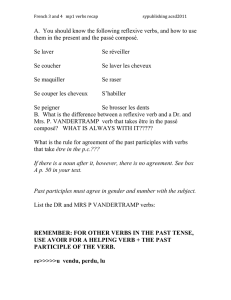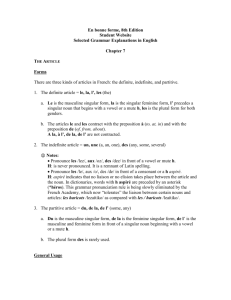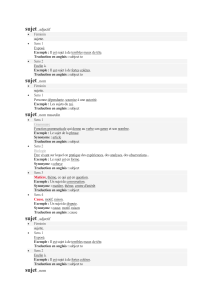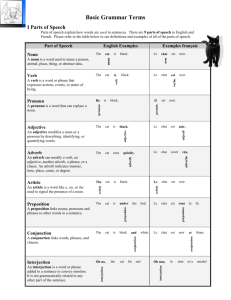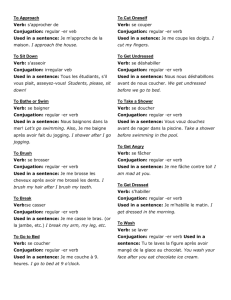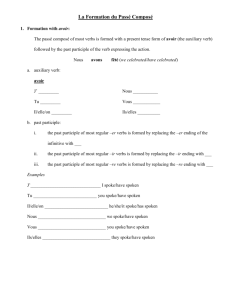File
advertisement
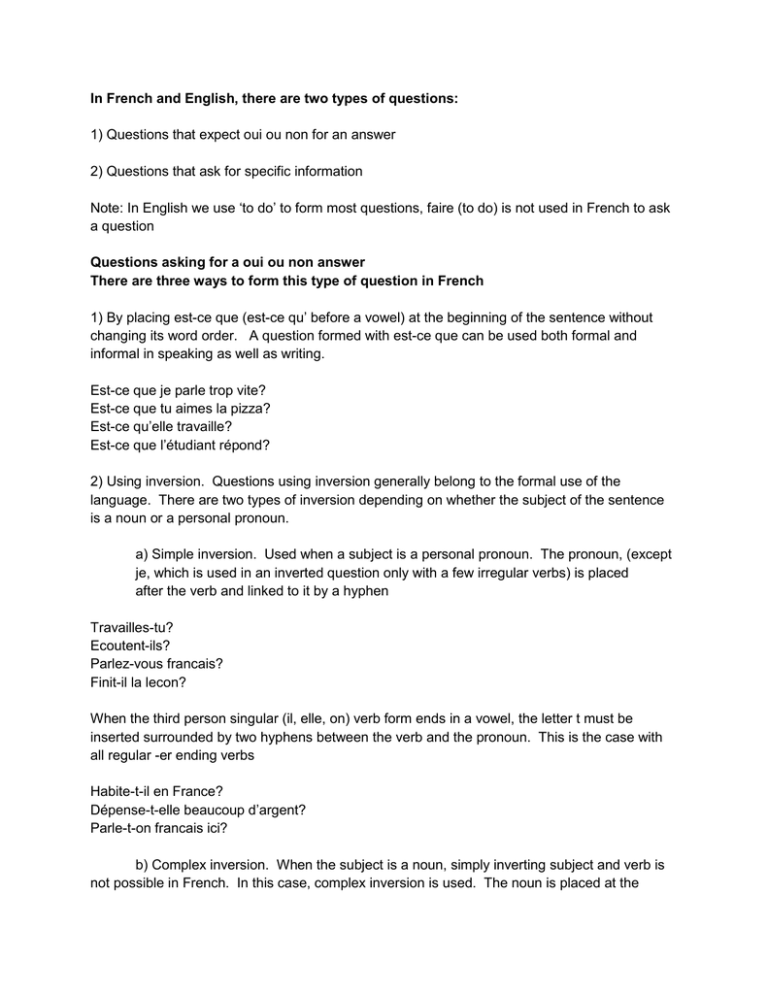
In French and English, there are two types of questions: 1) Questions that expect oui ou non for an answer 2) Questions that ask for specific information Note: In English we use ‘to do’ to form most questions, faire (to do) is not used in French to ask a question Questions asking for a oui ou non answer There are three ways to form this type of question in French 1) By placing est-ce que (est-ce qu’ before a vowel) at the beginning of the sentence without changing its word order. A question formed with est-ce que can be used both formal and informal in speaking as well as writing. Est-ce que je parle trop vite? Est-ce que tu aimes la pizza? Est-ce qu’elle travaille? Est-ce que l’étudiant répond? 2) Using inversion. Questions using inversion generally belong to the formal use of the language. There are two types of inversion depending on whether the subject of the sentence is a noun or a personal pronoun. a) Simple inversion. Used when a subject is a personal pronoun. The pronoun, (except je, which is used in an inverted question only with a few irregular verbs) is placed after the verb and linked to it by a hyphen Travailles-tu? Ecoutent-ils? Parlez-vous francais? Finit-il la lecon? When the third person singular (il, elle, on) verb form ends in a vowel, the letter t must be inserted surrounded by two hyphens between the verb and the pronoun. This is the case with all regular -er ending verbs Habite-t-il en France? Dépense-t-elle beaucoup d’argent? Parle-t-on francais ici? b) Complex inversion. When the subject is a noun, simply inverting subject and verb is not possible in French. In this case, complex inversion is used. The noun is placed at the beginning of the sentence, followed by the verb and the corresponding subject pronoun (i.e. il for any masculine singular noun, elle for every feminine singular noun, etc.) There is hyphen (or a hyphen +t+ hyphen if the verb ends in a vowel) between the verb and the subject pronoun. Questions using complex inversion are used in formal written French. Marie étude-t-elle le francais? Les étudiants travaillent-ils? 3) By intonation (i.e. by raising the pitch of one’s voice at the end of a statement) This type of question is of course restricted to the spoken language. It is very common on an informal level. Tu aimes le francais? Vous trouvez? Do you think so? Practice Do you (fam) like la musique rock? -Est-ce que tu aimes la musique rock? -Aimes-tu la musique rock? -Tu aimes la musique rock? Use methods 1 or 2 1) Do you (pol.) study French? 2) Does he watch television (la télévision)? 3) Do they visit the (le) Louvre? 4) Do I dance well (bien)? 5) Do we lose? Note: If the question expects an answer that confirms what has been asked, n’est-ce pas can be added at the end without changing the word order. Tu enseignes l’anglais, n’est-ce pas? David n’aime pas la pizza, n’est-ce pas? Here is the answer, what is the question? 1) Oui, j’aime la cuisine italienne 2) Non, Pierre n’habite pas a Paris 3) Oui, le cours commence a huit heures 4) Oui, nous visitons la France 5) Oui, Marie porte des lunettes (glasses) Questions asking for specific information Such questions begin with interrogative expressions ( interrogative adverbs, interrogative pronouns, or interrogative adjectives) a) Interrogative adverbs Ou Quand Comment Combien (de*) Pourquoi *Note that the noun following combien is always preceded by de. If combien is not followed by a noun, de is not used Combien dépenses-tu? Combien d’argent dépenses-tu? 1) If the subject is a pronoun, the interrogative adverbs are followed either (except with je) by simple inversion (=verb+hyphen+pronoun) or by est-ce que and regular word order Ou habites-tu? Ou est-ce que tu habites? Quand arrivons-nous? Quand est-ce que nous arrivons? Comment trouvez-vous la nourriture francaise? Comment est-ce que vous trouvez la nourriture francaise? Combien de langues parle-t-il? Combien de langues est-ce qu’il parle? Pourquoi détestez-vous les chats? Pourquoi est-ce que vous détestez les chats? 2) If the subject is a noun, the interrogative adverbs are followed either by complex inversion (=noun +verb+corresponding pronoun) or by est-ce que and regular word order Quand est-ce que le professeur arrive a l’école? Quand le professeur arrive-t-il a l’éecole? Note: after ou, comment, quand and combien simple inversion can be used with a noun subject in short sentences consisting only of a question word, a verb (in simple tense) and a subject (which comes at the end of the question) Ou travaille votre père? Quand commence le film? Combien coute le CD? But: After pourquoi, simple inversion is never used if the subject is a noun Pourquoi votre mère travaille-t-elle?
